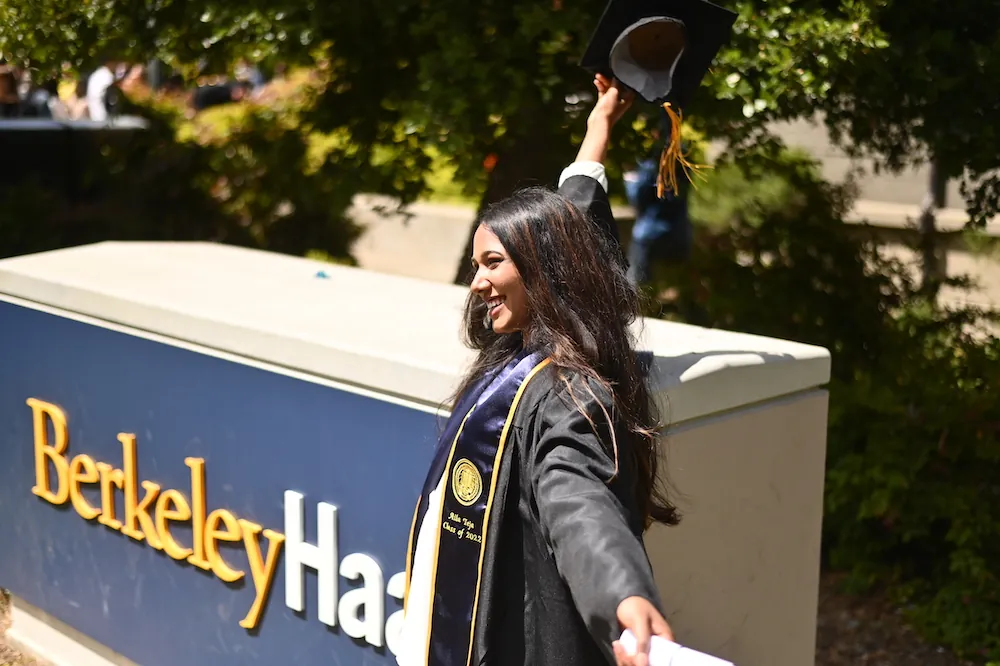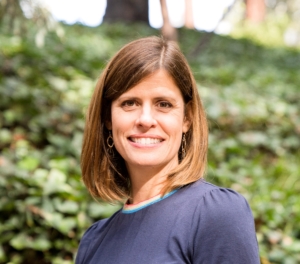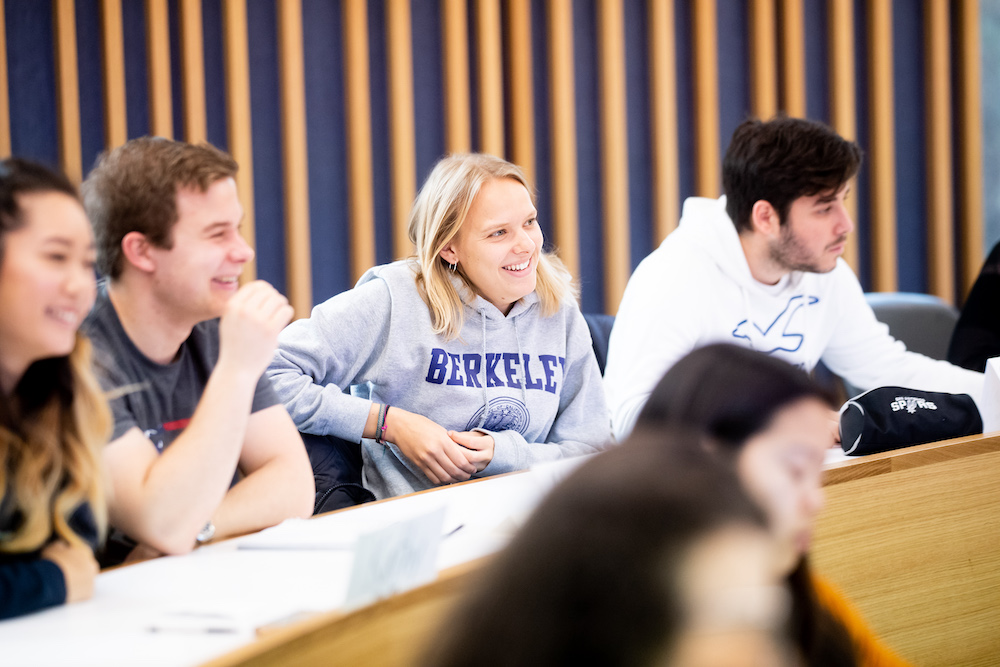
Undergraduate Commencement at Berkeley Haas. Photo Copyright, Noah Berger / 2022.
University of California-Berkeley Haas School of Business
In July, UC-Berkeley Haas announced a monumental change to its highly respected and highly ranked two-year undergraduate business program: It would expand to a four-year program beginning in August 2024.
That certainly caught our attention.
Haas is already elite. The University of California system is the largest in the United States, and its crown jewel, UC-Berkeley, is arguably the best public university in the world.
“Berkeley has always been a really good, highly ranked program,” Ann Harrison, dean of the Haas School, told P&Q in an exclusive interview this summer. “But I think this will take us to the very top. Moving from a two-year experience to a four-year experience is just going to allow us to create that much richer, deeper, longer experience that the students in the other top undergraduate business programs in the United States do have access to.”
The expansion will be funded by the largest gift in Haas’ history – $30 million from Haas alumnus Warren “Ned” Spieker, who earned his business bachelor’s degree from Berkeley in 1966, and his wife, Carol, who earned a political science degree from the university the same year. The four-year program will be called the Spieker Undergraduate Business Program.

Haas undergraduate program classes in Chou Hall. Photos Copyright Noah Berger
OTHER MOVES IN UNDERGRADUATE BUSINESS EDUCATION
Shortly after classes began this fall, Haas announced three other significant changes for its undergraduate program.
First, it was ending its maximum mean GPA grading policy, called the “Haas Curve” by students, to increase the spirit of collaboration amongst students as opposed to a feeling of competition. When Emma Hayes Daftary, assistant dean of the undergraduate program, announced the change to students, she got a standing ovation, Hayes told us this September.
The school also created a new Summer Minor in Sustainability in partnership with UC Berkeley’s Rausser College of Natural Resources. Courses for the 15-credit minor (five classes) will be taught over the summer, and students can opt to take them all at once or over the course of two years. Courses include topics such as Innovation and Entrepreneurship, Investing, Business Models and others, all focused around sustainability.
“We recognized that the College of Natural Resources is just a phenomenal force in this space around sustainability. Several of our employer partners have expressed that they want to bring students from all levels who have an understanding and passion for best practices around sustainability,” Daftary tells us.
Finally, the school will open the Haas Entrepreneurship Hub next year. The hub will be a one-stop shop for students across the university and at any point in their entrepreneurial journey to access and learn about Berkeley’s wide innovation ecosystem. This includes, but is not limited to, the Berkeley Haas Entrepreneurship program, the Sutardja Center in the engineering department, and the Startup@BerkeleyLaw. It also has accelerators, fellowship programs, industry partnerships and other programs to foster entrepreneurship among its students, faculty, and alumni.
The hub seems tailor made for Haas students like Daniel Tsentsiper, a 2022 graduate and founder of Veriply, a startup he founded as part of a class project.
“I am extremely proud to call myself a founder. I formed my startup, Veriply, with some of the brightest minds at Berkeley and in Denmark,” says Tsentsiper, a Best & Brightest business major of 2022.
“Veriply is a bookkeeping assistant that helps companies maintain clean records for better decision-making. What started as a class project in an entrepreneurship course at UC Berkeley quickly became a marketable solution for a widespread industry problem. We learned that existing players in our space overlook small businesses, favoring large enterprises with deep pockets. We want to level the playfield.”
P&Q INTERVIEW WITH EMMA HAYES DAFTARY
To learn more about these big changes – one seismic – coming to Haas School of Business, we reached out to Emma Hayes Daftary, assistant dean of the undergraduate program. You can read the interview below.
What are recent and upcoming program developments and innovations that will enhance the experience of future students?
The biggest development that will impact future generations of undergraduate business students at Haas is the creation of the Spieker Undergraduate Business Program. In July 2022, we announced that our two-year undergraduate business program would expand to become a four-year program, supported by the largest single gift in the school’s history. In recognition of the $30 million gift from Haas alumnus Warren “Ned” Spieker, BS 66, and his wife, Carol, BA 66, (political science), UC Berkeley named the four-year undergraduate business program the Spieker Undergraduate Business Program. The first four-year cohort of students will enroll in August of 2024.

Emma Hayes Daftary
We are in process of building out a robust orientation program that will onboard our first-year students into the business school, providing them with opportunities to connect, explore different industries and career pathways, and introduce them to our incredible Haas community.
What are your program’s two biggest differentiators from other top undergraduate business programs? How do these prepare students for their careers?
Part of what differentiates Haas, aside from its top ranking, is that the undergraduate program has added three multidisciplinary programs and one minor outside of the core program over the past several years, including:
- The Robinson Life Science, Business, and Entrepreneurship Program, a joint venture between the Department of Molecular and Cell Biology and Haas that allows students to earn a bachelor of science degree in business administration and a bachelor of arts degree in molecular and cell biology.
- The Global Management Program, a four-year international program that requires students to study abroad their first semester, fulfill a language requirement, and take specialized global business courses.
- The Management, Entrepreneurship & Technology (M.E.T.) program, a collaboration between Haas and the UC Berkeley College of Engineering that grants graduates two degrees in business and engineering in four years, with the goal of providing deep leadership and technology skills.
- The Summer Minor in Sustainable Business and Policy, a collaboration between Haas and the Department of Agricultural and Resource Economics that provides students with the skills needed for careers in business or government focused on sustainable business and policy.
Additionally, we have a distinctive culture that encourages our students to focus on seeking out innovative, evidence-based approaches; to practice a growth mindset around inclusion, diversity, and equity; and to look beyond the bottom line to assess impact on individuals, companies, communities, and our planet.
What separates your graduates from other business school graduates?
Berkeley Haas graduates actively demonstrate the courage to take innovative approaches, an appreciation for authentic collaboration, an ability to lead through inclusive practices, a desire to continue learning and growing throughout their career, and an awareness of our ethical responsibility to act as thoughtful stewards of our enterprises.
Explain the career services, programming, and extracurriculars that give your students an advantage in career outcomes?
Many elements come together to help Haas undergraduate students achieve their career aspirations:
- All Haas undergraduate students have access to the extensive resources that the UC Berkeley Career Center offers, including one-on-one advising with designated Career Counselors, career fairs, panel and workshops, job search and interview preparation digital tools, and an alumni community platform. With strong industry relationships, the Career Center organizes company visits to accounting and consulting firms, investment banks, technology, entertainment, and other companies in San Francisco, Silicon Valley, and Los Angeles to allow students to learn about specific industries. Since 2016, the Career Center has hosted the annual Haas Career Summit, an immersive one-day event that brings alumni and employers to campus, provides networking opportunities and helps Haas students prepare for recruiting.
- In addition, the Haas Undergraduate program offers supplementary financial modeling and valuation courses, provided by various partners.
- Many Haas students also take advantage of the professional-focused student clubs that enhance the school’s programming in career education.
What are two key qualities that prospective students must possess to land a spot in your program?
The mission of the Haas School of Business is to develop leaders who redefine how we do business. While most applicants offer promise for academic success, the Admission Committee selects individuals who also demonstrate excellence in non-academic performance. The goal of the admissions review process is not only to evaluate an applicant’s ability to handle the academic rigor, but also to identify those who demonstrate a solid fit with our program and our school culture.
The Haas Undergraduate Program has a distinct culture and we seek applicants who have a demonstrated commitment to the school’s four Defining Leadership Principles: Question the Status Quo, Confidence without Attitude, Students Always, and Beyond Yourself. Candidates should contemplate their meaning as an expected part of their life-long connection to the Haas School of Business.
When alumni look back on their time in your undergraduate business program, what would they consider to be their signature experience?
Many of our students have the opportunity to participate in case competitions, both internal (offered at Haas, in partnership with employer partners) and external (traveling to other universities in various locations, both domestic and international). Case competitions are an extensive case analysis competition program, which allows students to flex their creative problem-solving skills in real world business simulations. In this competition, the students are using their internship experiences and leadership-based curriculum to showcase their ability to thrive in an ever- evolving business environment. They can also network with other undergraduate business students from various institutions and professionals.
As we build the Spieker Undergraduate Program, we will develop more opportunities for students to participate in a capstone experience, such as a case competition or a sprint consultancy with a local organization.

Haas undergraduate classes. Copyright Noah Berger
What is the most underrated feature of your undergraduate business program and how does it enhance the experience for your business majors?
UC Berkeley is the number one public university in the country, and attracts students, faculty and staff who are genuinely curious about learning and shaping our current and future state. Haas students are able to curate academic journeys that are rich and engaging, enhancing and informing their business education with coursework across various disciplines, from cell biology to data science to global poverty to behavioral economics to engineering (to name a few). These opportunities shape our students’ worldview, challenging them to integrate diverse perspectives and creative approaches as they transition into careers that are fulfilling and deeply impactful.
Which employers are the biggest consumers of your undergraduate talent and what have they told you about your alumni that make them so special?
Haas undergraduates accept full-time offers directly out of school from top companies including Accenture, Amazon, Bain, Deloitte, EY, Goldman Sachs, J.P. Morgan, McKinsey, Microsoft and PwC.
We hear from these employers that what sets Haas students apart is their innovative and entrepreneurial spirit, among other factors. Haas students approach their work with the tenacity to contribute to and lead progressive change, taking innovative approaches that question the status quo. They value evidence-based approaches, utilizing data to inform and measure their work, and challenge themselves to continue growing and learning. Haas students are also keenly aware of the world around them; they weave sustainability practices throughout their work product, and center inclusion and equity principles in their interactions with others. All of these qualities make for impressive employees, which these employer partners consistently seek out in their hiring decisions.
What else would you like readers to know about your program?
As we build out our Spieker Undergraduate program, we are looking for students to join our community who are passionate about impacting progressive, positive change in all sectors, and who are committed to redefining the way we do business.
NEXT PAGE: University of Southern California Marshall School of Business











Questions about this article? Email us or leave a comment below.